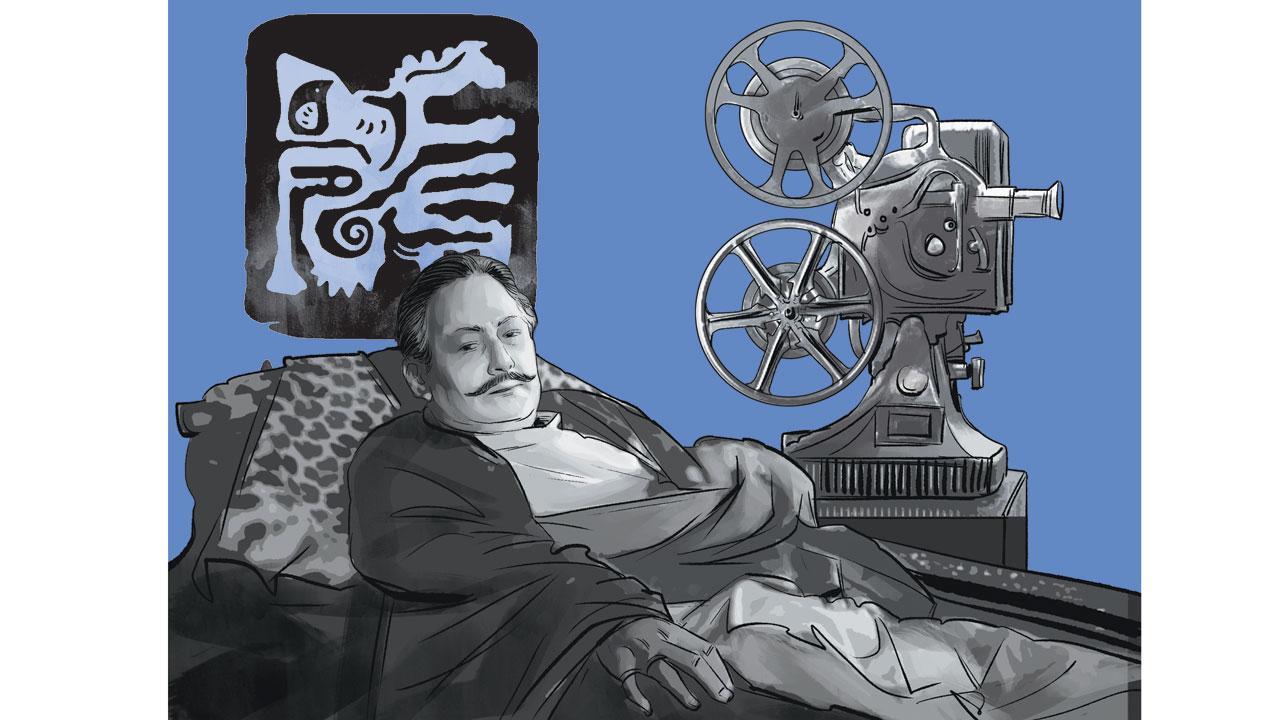In fact, Arcurea also explored creative ways for archival films, or images or sound to reach and engage with the public.

Illustration/Uday Mohite
![]() India doesn't really care much about its past or its history. Look at the state of our architectural monuments, or the way history is being blithely rewritten, with a “gheoon tak” attitude (Take it, man, go for it!). Essentially, Indian history has become a “green screen” game, in which we can cheerfully add, delete or rearrange our past and history any way we wish, no questions asked. As for archival films, older, celluloid films mostly vegetate in vaults; the Indian public can rarely watch them on the big screen. But last month, I was invited to conduct a curation workshop on Indian Cinema: Contemporary Challenges in Curation and Programming at the renowned Satyajit Ray Film and Television Institute (SRFTI), Kolkata. It was part of Arcurea, a unique and landmark international colloquium for film “archiving, curation, restoration, et al”, organised by SRFTI Dean Vipin Vijay, curator CS Venkiteswaran, Madhavi Tangella and multiple teams, backed by SRFTI, NFDC, NFAI and the National Heritage Mission.
India doesn't really care much about its past or its history. Look at the state of our architectural monuments, or the way history is being blithely rewritten, with a “gheoon tak” attitude (Take it, man, go for it!). Essentially, Indian history has become a “green screen” game, in which we can cheerfully add, delete or rearrange our past and history any way we wish, no questions asked. As for archival films, older, celluloid films mostly vegetate in vaults; the Indian public can rarely watch them on the big screen. But last month, I was invited to conduct a curation workshop on Indian Cinema: Contemporary Challenges in Curation and Programming at the renowned Satyajit Ray Film and Television Institute (SRFTI), Kolkata. It was part of Arcurea, a unique and landmark international colloquium for film “archiving, curation, restoration, et al”, organised by SRFTI Dean Vipin Vijay, curator CS Venkiteswaran, Madhavi Tangella and multiple teams, backed by SRFTI, NFDC, NFAI and the National Heritage Mission.
ADVERTISEMENT
In fact, Arcurea also explored creative ways for archival films, or images or sound to reach and engage with the public. Photographer Dayanita Singh presented some of the most original and intoxicating ideas on this. She shared how fearlessly—in collaboration with German publisher Gerhard Steidl—she exhibited her photographs/books in various permutations of her photograph collections, including a Museum of Chance, Museum Bhavan books in a box, a Suitcase Museum, and even a Pocket Museum, with a jacket with large pockets in which to slip books, firmly demolishing the myth of the brick-and-mortar museum as the sole option for public display and interaction.
The colloquium was visionary in the breadth and depth of the subjects discussed, from the ethics of film preservation to the “expanded archive” of Indian short films, discussed by senior curators and experts, including Dr Paolo Cherchi Usai (George Eastman Museum, New York), film historian Ashish Rajadhyaksha, Ravi Vasudevan (Sarai), Markus Ruff (Arsenal-Institute for Film and Video Art, Berlin), Madhusree Dutta (Majlis, Academy of the Arts of the World, Cologne), Shivendra Singh Dungarpur (Film Heritage Foundation), Chalida Uabumrungjit (Film Archive, Thailand) and Karen Chan (Asian Film Archive, Singapore). The expert speakers included Moinak Biswas, Shai Heredia and Nida Ghose, among others. There were film screenings, exhibitions, theatre and music performances, including a screening of the restored 1921 silent film Behula, directed by Camille Legrand and starring Patience Cooper, with live music by Borno Anonyo and ensemble.
For my curation workshop on Indian Cinema: Contemporary Challenges in Film Curation and Programming, I discussed my curating career in bullet points in 45 mins, including clips from Satyajit Ray’s Devi (Bengali), Rajiv Menon’s Kandukondain Kandukondain (Tamil), and V Shantaram’s Pinjra (Marathi), to illustrate my diverse curating work for the Toronto International Film Festival’s TIFF Cinematheque, British Film Institute, and Deutsches Filminstitut & Filmmuseum, Frankfurt. I discussed how I got work opportunities, what skills and tasks curation requires, how I persuaded institutions to look beyond Bollywood and Satyajit Ray, and found cinematic links to local audiences. I had also curated The Die Is Caste for the Kochi Muziris Biennale in 2017, with films and music on caste issues, including performances by Bant Singh (protest singer, Punjab), Manimaran and family (Parai, Chennai) and Karinthalakoottam (indigenous ensemble, Trichur). The wonderful curator Bina Paul, who spoke right after my session, described me as the Toofan Express, ha ha!
The colloquium was possible because of support from Himansu Sekhar Khatua, then SRFTI Director, Sanjay Jaju, Secretary, and Neerja Sekhar, Additional Secretary, both from the Ministry of Information and Broadcasting, and multiple teams. And the SRFTI campus, with its many beautiful flowering trees, lawns, and lakes, was a glorious place to be.
Meenakshi Shedde is India and South Asia Delegate to the Berlin International Film Festival, National Award-winning critic, curator to festivals worldwide and journalist.
Reach her at meenakshi.shedde@mid-day.com
 Subscribe today by clicking the link and stay updated with the latest news!" Click here!
Subscribe today by clicking the link and stay updated with the latest news!" Click here!








